Snapshots of pandemic life, part 3
Yuen Ching Lee ’19
Yuen Ching is a journalist in Petaling Jaya, Malaysia.
How has the pandemic impacted your work?
When the pandemic started, I was working with a nonprofit organization as an English language teacher. But when the pandemic hit and the country went into lockdown, the staff’s pay also got cut by half, and we were severely overworked. I decided to leave and soon got a job with a startup news company called The Vibes that launched in September of 2020.
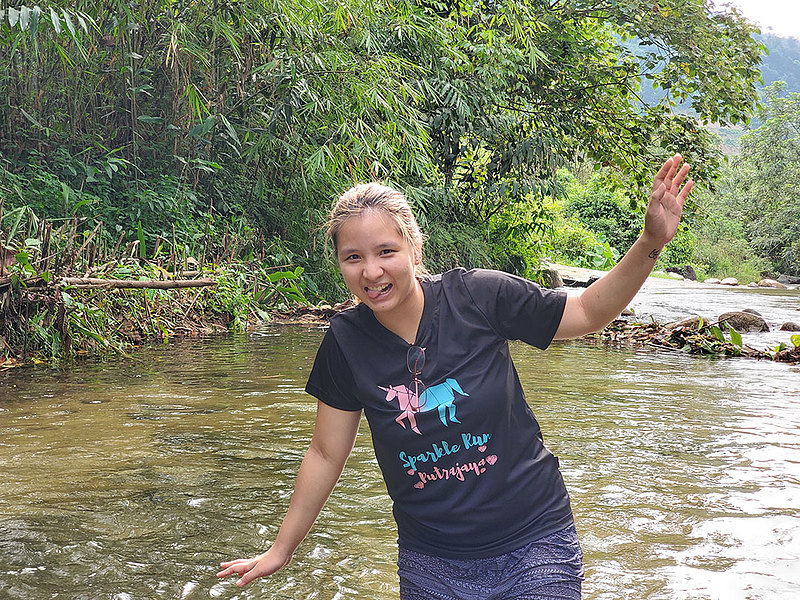
Yuen Ching Lee in Malaysia
While I didn’t face the same pay cut, the scariest part of working in the media is the amount of exposure we get when reporters like us go out for our assignments and are crammed into a room for a press conference.
Malaysia went into lockdown a few times and we were allowed to work from home for a bit, which helped, but we were still exposed whenever we went on assignments or had to come into the office for meetings. We’ve even had a few COVID scares with colleagues being in proximity to someone who tested positive.
How has your neighborhood or city changed?
I live in a city where shops usually close late and we have eateries that are open 24/7. However, this pandemic put an earlier curfew on these businesses. So the nightlife has sort of dwindled.
Regulations like having to wear a mask at all times outside of your own house and registering in a system before entering any shop have been put in place. The system is called MySejahtera, which translates directly from Malay to English as MyProsperity. This is implemented throughout the country. Users register, and each business is given a special QR code. Before entering the building’s premises, citizens are required to scan the business’s unique QR code. The purpose of this system is to keep track of patrons and alert them if anyone who has tested positive for COVID was in the same proximity as them.
What customs or celebrations have been practiced differently because of COVID?
A lot of our national holidays had to undergo a major shift as the government put a ban on interstate traveling, and many families were unable to return to their hometown to celebrate those festivities. Family gatherings were jeopardized. So major traditional festivals—a few being Lunar New Year, Eid Mubarak, and Thaipusam—could not be celebrated the way they usually are.
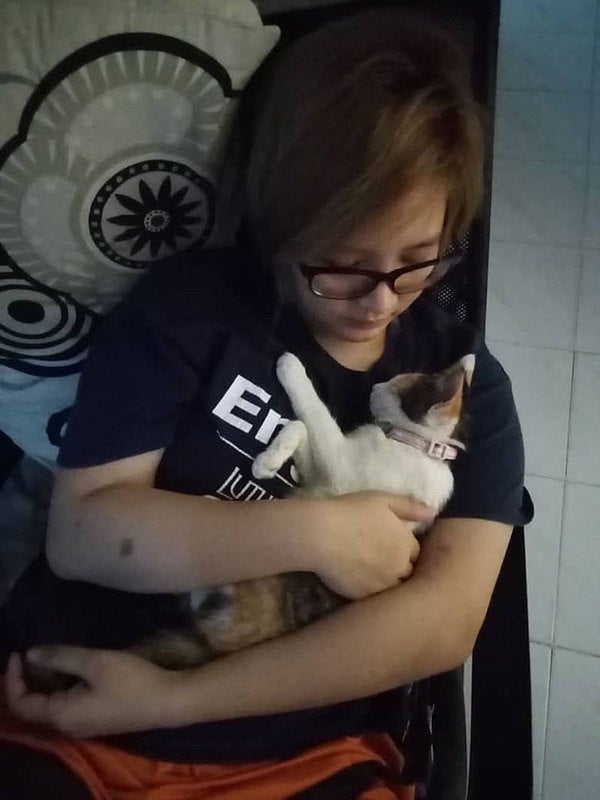
Like many people around the world, Yuen Ching (note the Luther shirt!) adopted a pet during the pandemic.
At its strictest, what measures did Malaysia institute?
At its strictest, Malaysian went into lockdown for about three months in 2020, starting in March. Businesses were forced to only open between 8 a.m. and 8 p.m., no dine-ins were allowed, there was a limit of a maximum of two people in a car, interdistrict and interstate traveling was banned, roadblocks were put in place by our police department.
Conditions have fluctuated since then. The lockdown has been lifted, then instilled, then it became conditional with more relaxed regulations.
As of spring 2021, we are still under conditional lockdown, interstate traveling is still banned, people are allowed to dine in provided they follow standard operating procedures (SOPs) set by the government.
Are you satisfied with the measures that have been put in place?
The country is far from having the pandemic under control as we are still hitting over a thousand cases a day [in mid-March]. The government has put unnecessary regulations in areas that didn’t make sense and relaxed in areas that mattered.
Working in the news, it is interesting and eye-opening to see the different feedback on the way my government is handling things. Generally, it’s a split between people who are taking the SOPs very seriously and those who are just playing with fire.
I honestly think that we should still stay in lockdown until the cases drop to at least single digits.
What do you look forward to about post-pandemic life?
I definitely look forward to going back to the nightlife, mostly the roadside eateries and night markets that have been forced to close early or not open stalls at all.
Nadia Onsando ’16
Nadia works in Nairobi, Kenya, for One Acre Fund, a nonprofit that supports East African smallholder farmers.
How has the pandemic impacted your work?
I am now working from home! Our office closed a day or two after the first case was confirmed in Kenya (March 2020), and we have remained closed since. There have been a couple of times leadership has thought of reopening the office, however the rising number of cases has always caused them to postpone reopening. Working online has its challenges, power outages and internet downtime aside, but I think I’ve adjusted pretty well and can’t imagine going back to work from the office full-time now.
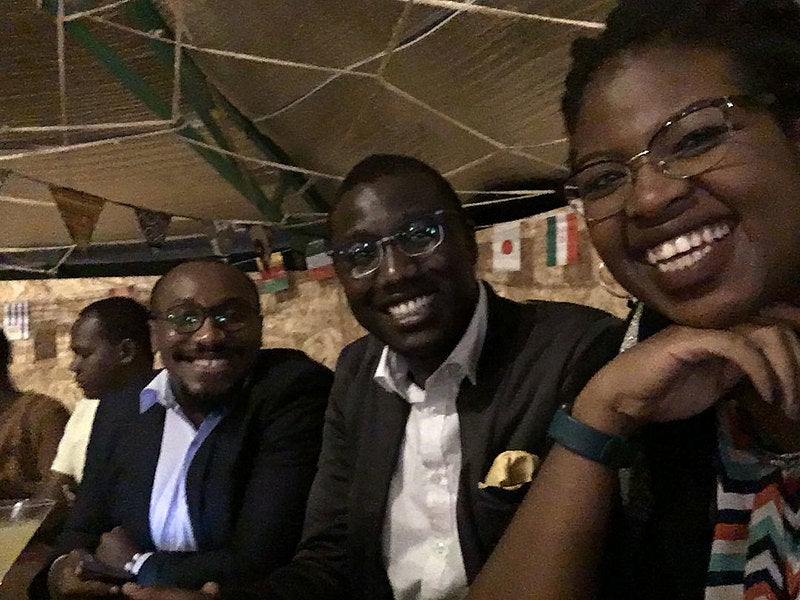
Nadia Onsando with friends at an open-mic in Nairobi. It was one of the last public events she attended pre-COVID.
What has school looked like in Kenya?
My brother (16) was home for most of last year as all schools were closed, and students were required to attend online classes.
How has your neighborhood or city changed?
Everyone wears masks now! You can’t gain entry to a restaurant, mall, or shopping center without wearing one, and most places have temperature checks and sanitizer or a hand washing station at the entrance of each establishment.
At its strictest, what measures did Kenya institute?
The curfew. At its strictest, we had a nationwide 7 p.m. to 5 a.m. curfew. At the moment it’s been eased to 10 p.m. to 4 a.m. [now, in May, 8 p.m. to 4 a.m.]. Most supermarkets close at 8 p.m. in Nairobi and restaurants/bars at 9 p.m. We also had a county lockdown last year, so if you lived in certain counties (Nairobi included), you could not leave the county limits.
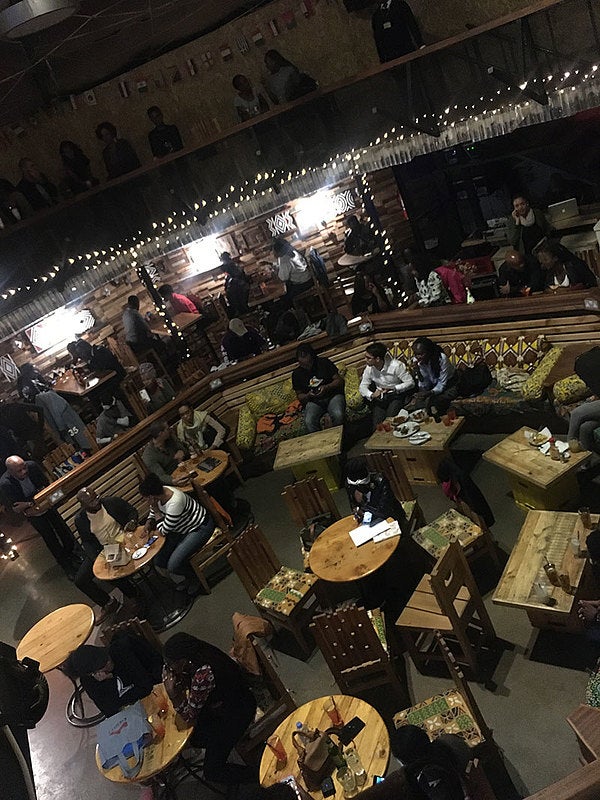
Nadia sent this photo of Nairobi's vibrant nightlife pre-pandemic.
Are you satisfied with the measures that have been put in place?
I think the measures themselves have been all right, I just wish more effort had been put in supplying hospitals with the beds, ventilators, and PPE needed by the brave doctors and nurses who are fighting the pandemic every day.
What do you look forward to about post-pandemic life?
Not wearing a mask anymore! Seeing family and friends more frequently, without fear that our interaction could harm them. Being out past 10 p.m.! Nairobi has a thriving nightlife that is impossible to be enjoyed during a pandemic.
Peter Forsgren ’82, Jake Dibbert ’02, and Sam Oines ’11
Peter, Jake, and Sam teach at an international school in Vienna, Austria.
How has the pandemic impacted your work?
Jake: The three of us work in the middle school, and we have seen firsthand the effects of the pandemic on student learning. Surprisingly, not every student has been negatively impacted, as you might assume. We’ve observed that some students have really thrived with distance learning and they would prefer this to be their primary learning experience, as long as they had the opportunity for socialization. These students in particular have demonstrated the learning skills and habits of managing their learning more independently in a more focused learning environment. Schools have a lot to learn about how we can create more flexible and adaptive learning models to meet the variety of learning needs of our students.
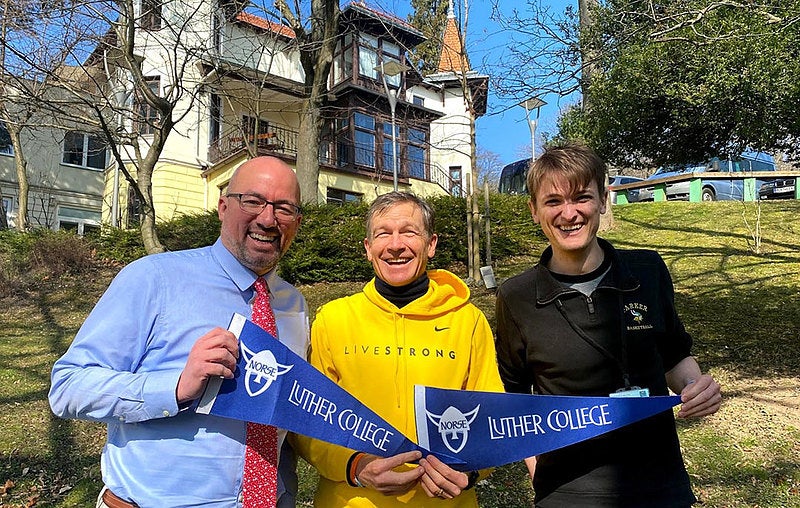
Jake Dibbert ’02, Peter Forsgren ’82, and Sam Oines ’11 teach at the same school in Vienna, Austria.
Sam: As we enter what is my fourth trip into distance learning, I am amazed at the resilience of our students and teachers. Despite all the switches in educational models this past year, we still manage to hold everything together and make learning happen. We are lucky though and grateful for the first few months we had together on campus with all of our students. The relationships we formed then still sustain so many of us through the lockdowns and distancing of this year, and they make it much easier to deal with all the challenges that come up.
What has school looked like for your own kids over the past year?
Peter: Fortunately both our sons work in Vienna at the moment, and our older son, Jonathan, moved to Vienna during the pandemic. We have had the opportunity to share special family moments by living in the same city and treasure the small encounters or meals, bike rides, and holidays in nature.
Jake: I am a parent of three young children; two of them are in kindergarten. Since the pandemic started, our children have really struggled with engagement over time, and especially in the early years of school, so much of the learning experience is social, classroom-based learning. While we regret not having them experience this fully, we hope that they are resilient and will be able to come out of this just fine.
How has your neighborhood or city changed?
Peter: Fewer people on the streets and on public transportation. At times you need to line up outside to purchase items. The testing centers are available for free and at many locations. The vaccines are also available for free and through appointment.
Jake: We have experienced lockdowns in both the Middle East and here in Vienna since the pandemic began. In the Middle East, the first lockdowns were much more stringent, not allowing anyone to leave their home without an official permit. Since moving to Vienna, there is consideration for mental and physical wellness, especially for children, and so we have been able to visit any number of the beautiful parks in the city during the extended lockdowns.
Sam: Like Jake, I got to experience lockdowns in two different countries: Japan and Austria. Mask wearing was already a part of Japanese culture, so nearly 100 percent of the residents in Tokyo were masked indoors and out once the lockdown started. When I arrived in Austria, the numbers were so low, it felt fairly open compared to my experience in Japan. I still haven’t seen a concert though or been to the theatre in Vienna. I am eager for that day when I can really see the city in its full glory.
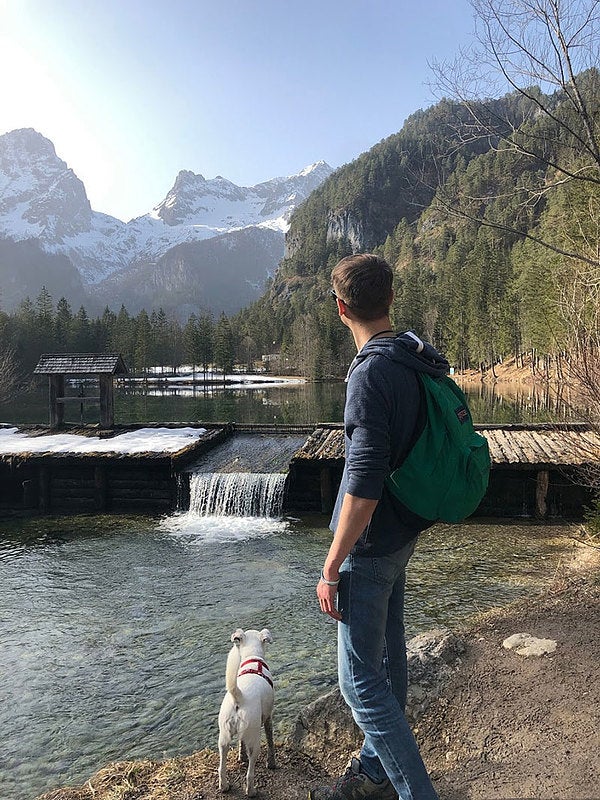
Sam Oines visited Schiederweiher in Hinterstoder, Upper Austria, during the pandemic.
What customs or celebrations have been practiced differently because of COVID?
Peter: The famous Christmas and Easter markets were canceled. All large public events that include marathons, etc. were done virtually.
At its strictest, what measures did Austria institute?
Peter: Curfews, fines for violating the rules, no non-essential stores were open, churches closed for worship services, testing for the whole school community twice a week, A and B schedules at school, traveling and quarantine requirements.
Are you satisfied with the measures that have been put in place?
Peter: We accept the measures as they are prepared and implemented for the health and well-being of the greater community. This includes masks in all public venues and now public gatherings.
Jake: I have found that, generally speaking, people comply with the measures imposed by the Austrian authorities. While there have been some smaller gatherings of protesters on the weekends, most people understand the bigger picture and are making the necessary sacrifices that will bring us back to some version of normality.
Sam: Everyone is tired but still willing to hold out until we get to the other side of this. The measures have been tough at times but clearly done for public health. Most go along with the measures the Austrian government puts in place with the understanding that things are changing from week to week.
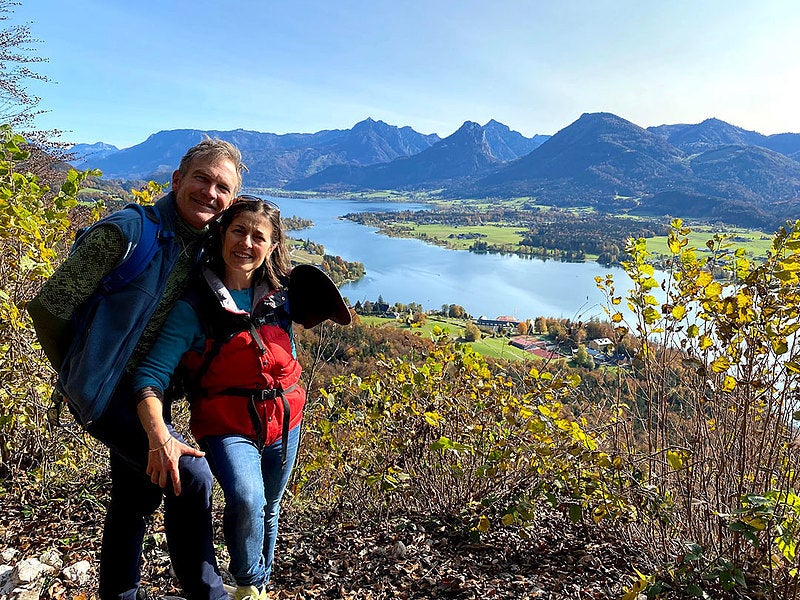
Peter and Luisa Forsgren traveled to the Alps to weather the COVID storm.
What do you look forward to about post-pandemic life?
Peter: Slowing down and savoring the educational and recreational moments we share with family and friends. Having the freedom to travel to see family and friends.
Jake: Because we made an international move during the pandemic, we feel that we have not yet experienced the cultural richness of Austria and look forward to the freedom of movement and opportunities to get out into the city and beyond to experience everything on offer in this wonderful country.
Sam: Returning to the States to see my family. Since I was already moving countries during the pandemic, I didn’t get a chance to visit last summer, so I am eager to see my nephews and all the people I love back in the Midwest.
Laurel Morris ’18
Laurel works as a case manager at Living Water Community in Chaguanas, Trinidad and Tobago.
How has the pandemic impacted your work?/strong>
I work at a local NGO that provides services to migrants, asylum seekers, and refugees. I am a case manager for survivors of gender-based violence. Like most other countries around the world, the pandemic caused an increase in the number of these cases that came to our attention. We were forced to go remote to provide our services, which could be difficult at times because our job often depends on being mobile. However, other parts of the organization were able to flourish, such as our food department, which was able to partner with a local tech company and provide beneficiaries with QR codes that they could use at select groceries around the country in place of having persons gather to collect food bags or exhaust resources by making deliveries to each house.
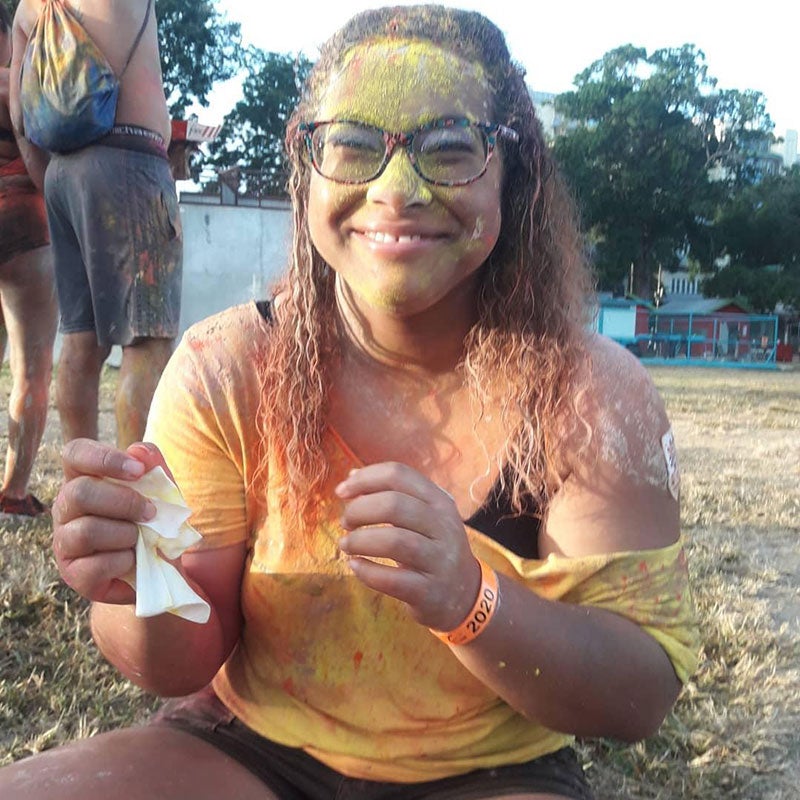
Laurel Morris participating in Carnival 2020 in Trinidad and Tobago
What has school looked like for kids in your country over the past year?
Schools were closed in March of last year and opened only last month [February] to select year groups that are sitting national exams. They are doing a blended model.
What customs or celebrations have been practiced differently because of COVID?
The biggest one for us is Carnival, which is considered the greatest show on earth. It happens around the same time as Mardi Gras in New Orleans and Carnival in Brazil. Everything was virtual, and it was really hard not to have it this year. Every year without fail, Carnival brings the country together, and you can feel it in the air. It’s electric! This year, unfortunately, that was missing.
At its strictest, what measures did Trinidad and Tobago institute?
The borders were closed to both non-nationals and nationals. Nationals were only able to enter through an exemption system. That is still in place currently. All non-essentials were closed, initially with restaurants remaining open only for takeaway or deliveries. Only groceries and pharmacies were open for a time, and persons not working in these businesses needed to get a letter indicating that you were considered an essential worker. There was also an informal 6 p.m. curfew. Everything was opened in phases, some with limitations. Waterparks remain closed. The beach has a 6 p.m. curfew, and every other business must close by 10 p.m. Mask wearing is nationally mandated, including in vehicles. Restaurants can have 50 percent capacity for in-house dining but cannot serve alcohol. Bars cannot have anyone congregating inside.
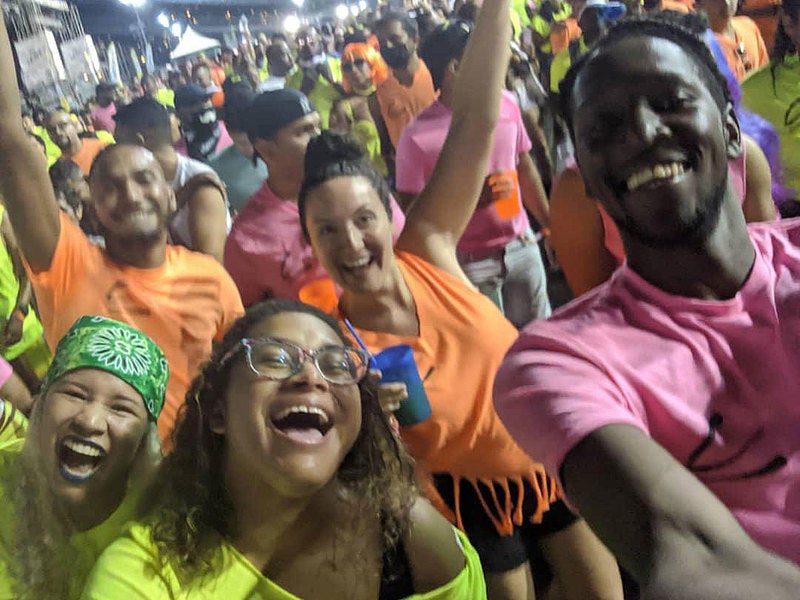
"Carnival brings the country together," says Laurel, shown here in glasses at the 2020 celebration.
Are you satisfied with the measures that have been put in place?
Yes, most people are satisfied and comply with the measures because they understand the importance of keeping the numbers low. Many people are looking forward to more relaxing of regulations and restrictions.
What do you look forward to about post-pandemic life?
Carnival!